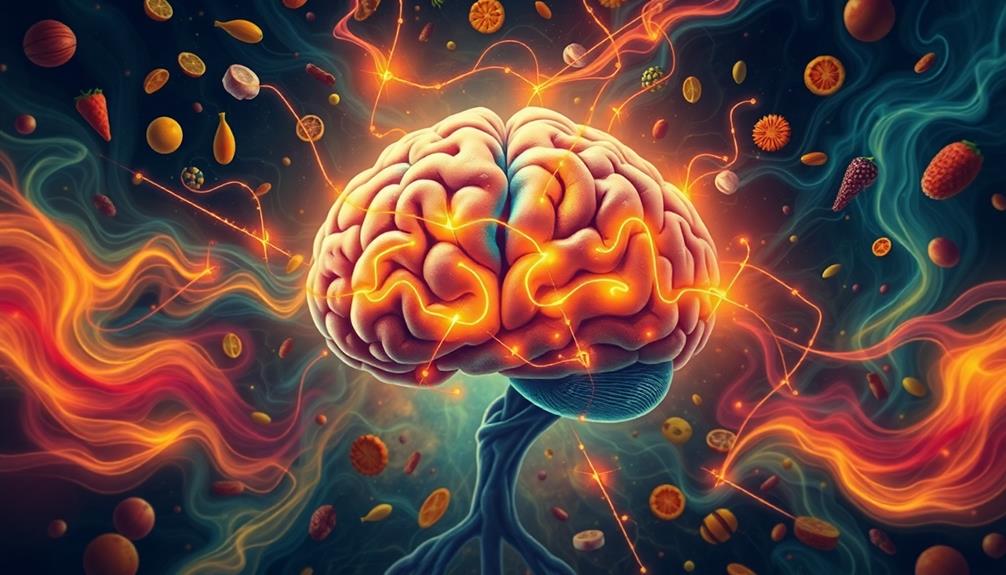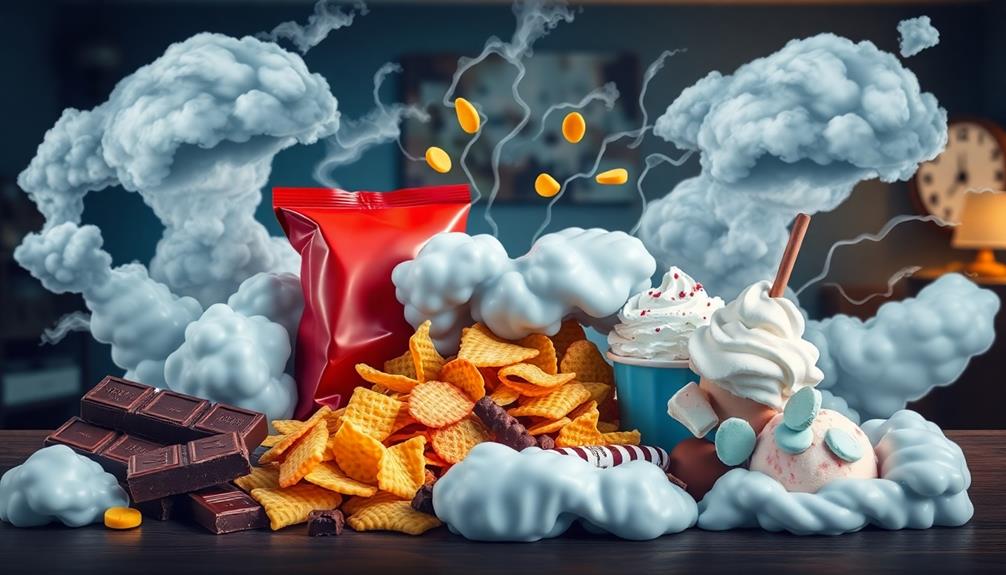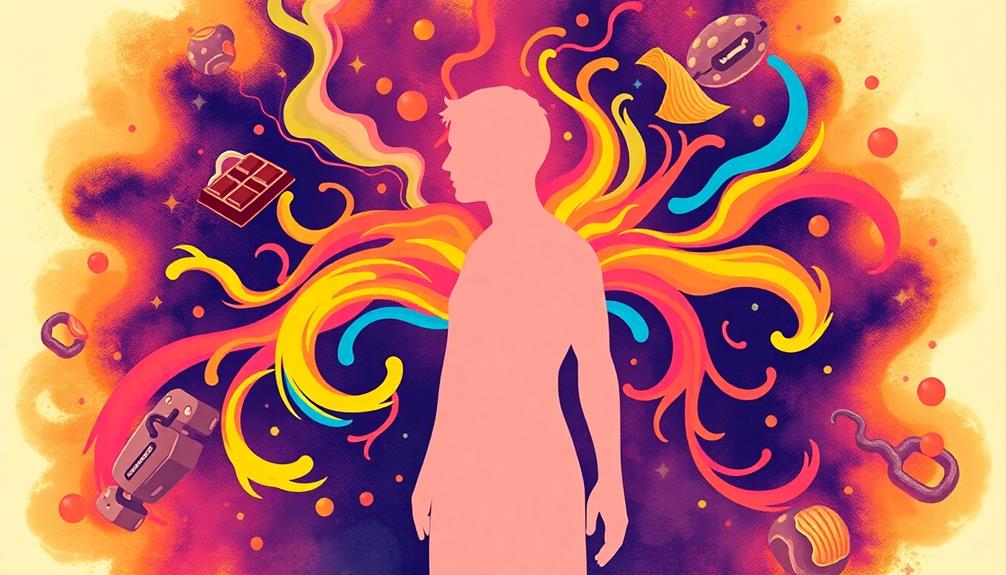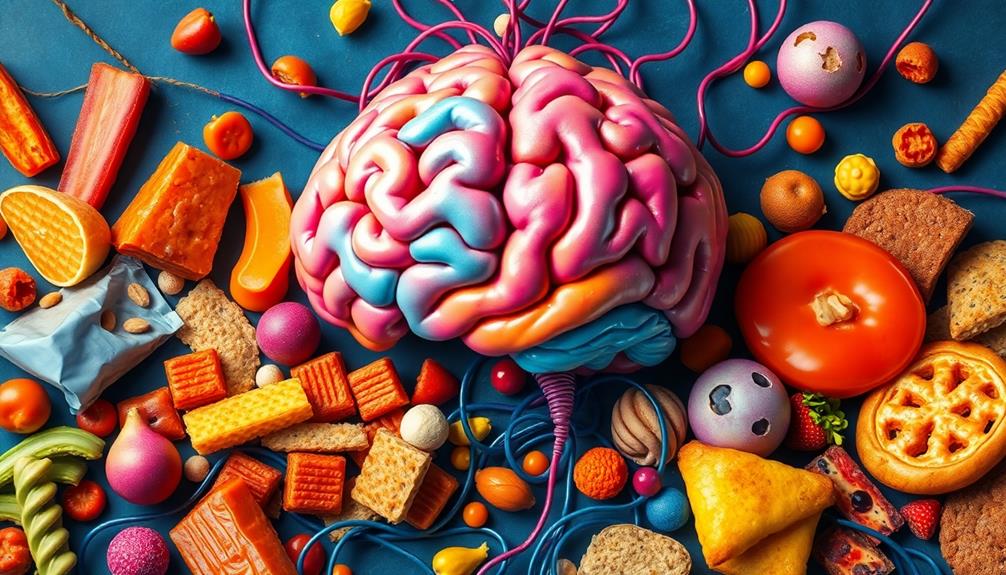When you're stressed, your body undergoes hormonal changes that heighten cravings for calorie-dense comfort foods. Chronic stress activates your HPA axis, raising cortisol levels, which boosts appetite and drives you to seek sweets and fats. This isn't just about physical hunger; emotional factors play a huge role. You might find yourself eating more, even when you're not truly hungry. Understanding these cravings and their psychological triggers can help manage your eating habits. If you explore further, you'll uncover effective strategies to address those cravings and maintain a balanced approach to food during stressful times.
Key Takeaways
- Chronic stress activates the HPA axis, increasing cortisol levels that heighten cravings for high-calorie comfort foods, especially sweets and fats.
- Elevated cortisol disrupts the recognition of satiety, leading to overeating even when not physically hungry.
- Psychological factors, such as emotional triggers, significantly influence food cravings during stressful situations, often resulting in emotional eating.
- Hormonal changes, including increased ghrelin and insulin, further drive appetite and preference for calorie-dense foods during stress.
- Managing stress through mindfulness, physical activity, and social support can help mitigate cravings and promote healthier eating habits.
Mechanisms of Hunger Regulation

Hunger regulation is a complex dance involving your gastrointestinal tract, hormones, and nervous system, with the hypothalamus acting as the conductor. This intricate system guarantees appetite control through a balance of various physiological mechanisms. When your stomach empties, ghrelin, often dubbed the hunger hormone, signals your brain to stimulate appetite.
In contrast, hormones like leptin and cholecystokinin (CCK) provide negative feedback, suppressing hunger during food absorption. Additionally, the types of food you crave can be influenced by cultural preferences and personal experiences, such as enjoying Mushroom Masala for its rich blend of spices.
Neural signals from your gastrointestinal tract also play an important role in short-term hunger regulation. For instance, the distension of your stomach inhibits appetite via the vagus nerve.
Long-term appetite regulation relies heavily on leptin levels, which increase with food intake and decrease when caloric consumption drops. This fluctuation helps your brain adjust hunger levels accordingly.
However, it's vital to recognize that psychological factors, including your cravings and food preferences, greatly influence your food intake behavior. Stress-related eating often complicates this balance, leading you to seek comfort foods that may not align with your nutritional needs.
Understanding these mechanisms can empower you to make informed choices about your eating habits.
Impact of Stress on Cravings

Stress can markedly alter your food cravings, pushing you toward high-fat and high-sugar comfort foods. When you're under chronic stress, your body activates the HPA axis, leading to increased cortisol levels. This hormone heightens your hunger response, making you crave calorie-dense options that provide a quick escape from stress.
For instance, many people find themselves reaching for dishes like Red-Braised Pork Belly, which offer rich flavors and satisfying textures. Research shows that around 40% of people report increased caloric intake during stressful times, favoring hyperpalatable foods that stimulate your brain's reward centers.
Interestingly, these food cravings often occur even when you're not physically hungry. This indicates a significant psychological component driving your desire for certain foods. Elevated cortisol not only promotes cravings for unhealthy options but also shapes your eating behavior, leading to patterns of emotional eating.
You might find yourself reaching for high-fat foods, seeking comfort and relief, which can result in potential weight gain over time. Your food preferences shift, and what once seemed like an occasional indulgence turns into a go-to source of stress relief.
Recognizing this impact of stress on cravings can help you develop healthier coping strategies and make more mindful food choices.
Hormonal Responses to Stress

When faced with chronic stress, your body undergoes significant hormonal changes that can directly impact your eating habits. The activation of the hypothalamic-pituitary-adrenal (HPA) axis leads to increased cortisol levels, which can heighten cravings for high-calorie foods. This hormonal response can make it tough to manage your appetite, often causing you to overeat.
Here's a quick overview of the hormonal responses during stress:
| Hormone | Effect on Appetite | Impact on Eating Behavior |
|---|---|---|
| Cortisol | Increases cravings for sweets and fats | Promotes emotional eating |
| Ghrelin | Stimulates hunger | Leads to eating despite satiety |
| Insulin | Increases appetite | Drives preference for calorie-dense foods |
These hormonal changes can disrupt your ability to recognize satiety, making it easy to indulge in unhealthy snacks. As a result, you may find it difficult to maintain weight management. Understanding these mechanisms can help you better navigate your cravings and make healthier choices, even in stressful times.
Psychological Factors in Eating

Many people don't realize how psychological factors can deeply influence their eating habits. When you experience stress, your body often craves comfort foods high in sugar and fat, leading to stress eating. This response is tied to emotional eating, where you turn to food as a coping mechanism for negative feelings. For instance, traditional dishes like Yebeg Wat showcase how cultural comfort foods can become a go-to during tough times.
- High-stress levels can increase your caloric intake by up to 40%.
- Chronic stress activates the HPA axis, elevating cortisol levels that drive cravings for calorie-dense foods.
- Women are more likely to engage in emotional eating, reinforcing unhealthy associations with food.
These psychological factors complicate weight management efforts and contribute to habitual overeating.
As you navigate stressful situations, it's important to recognize how your emotions might push you toward those hyperpalatable foods that activate your brain's reward centers.
Chronic Stress and Weight Gain

Chronic stress can trigger a cascade of hormonal changes that greatly impact your appetite and eating behaviors. Elevated cortisol levels, often associated with chronic stress, can lead to increased food cravings, particularly for calorie-dense comfort foods like Loaded Baked Potatoes. This shift in appetite regulation can contribute substantially to weight gain.
Research highlights that food cravings serve as a vital link between chronic stress and an increased body mass index (BMI), indicating that stress directly influences your eating habits.
When you're under chronic stress, you might find yourself engaging in less physical activity, which compounds the issue. As you favor calorie-dense foods, your eating behaviors tend to change, making it easier to overeat.
Additionally, chronic stress can alter your brain's response to satiety signals, leading you to consume more food even when you're not hungry. This disruption in appetite regulation further promotes weight gain.
Studies show that the prevalence of obesity is significantly higher among individuals dealing with chronic stress, particularly in women, emphasizing the need to understand how stress-related eating impacts your weight management efforts.
Strategies for Managing Cravings

Managing food cravings during stressful times requires a proactive approach. By implementing effective strategies, you can better manage cravings and make healthier choices. Here are some tips to help you navigate through stress without turning to unhealthy foods:
– Remove temptations: Clear your home of high-fat and sugary snacks. This simple act can considerably reduce the urge to indulge in unhealthy foods during stressful moments.
Incorporating wholesome meals like Nettle and Potato Soup can also provide you with a nutritious alternative to satisfy hunger and comfort during stressful times.
– Engage in physical activity: Regular exercise or yoga can help alleviate stress and decrease cravings for unhealthy foods. Find an activity you enjoy to stay motivated.
Cooking seasonal dishes, such as a reinvigorating Grilled Peach and Burrata Salad, can also serve as a delightful way to combine physical activity with meal preparation.
– Practice mindfulness techniques: Meditation or deep-breathing exercises can lower stress levels and enhance your awareness of food choices, making it easier to resist impulsive cravings.
Additionally, building a strong social support system with friends and family can provide emotional comfort, helping you avoid relying on food for stress relief.
Meal prepping nutritious options guarantees you have healthy snacks readily available, allowing you to manage cravings more effectively.
Frequently Asked Questions
How Does Stress Affect Appetite?
Stress affects your appetite by triggering hormonal changes that increase cravings, especially for high-calorie foods. You might find yourself eating more, even when you're not hungry, as stress pushes you toward comfort foods for relief.
How Does Stress Influence Your Eating Choices?
Stress influences your eating choices by driving you toward high-fat and high-sugar comfort foods. You might find yourself craving these calorie-dense options more often, making it harder to recognize when you're truly full.
What Is the Science Behind Food Cravings?
Food cravings stem from complex interactions among hormones, neurotransmitters, and brain circuits. When you experience cravings, your brain seeks pleasure and reward, often pushing you towards high-calorie foods that provide comfort and satisfaction during challenging times.
Does High Cortisol Cause Food Cravings?
Yes, high cortisol can definitely cause food cravings. When you're stressed, your body releases cortisol, increasing your desire for high-calorie, comforting foods, making it harder to resist those tempting snacks during tough times.
Conclusion
To sum up, understanding the science behind your food cravings during stress can empower you to make better choices. For instance, imagine Sarah, who, under stress from work deadlines, reaches for ice cream instead of a salad. By recognizing her triggers, she starts exploring healthier stress-relief strategies, like yoga and mindfulness. This shift not only lessens her cravings but also helps her manage stress more effectively. So, next time you crave comfort food, consider what your body really needs.








